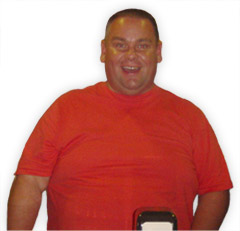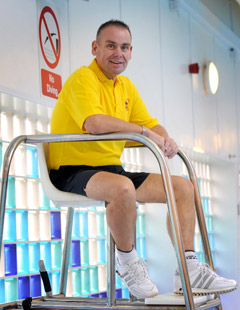Phil, Rhyl, North Wales
“I realised it was time to save my own life,” says lifeguard trainer Phil.
Growing up in Rhyl, North Wales, Phil was happy, fit and active.
He was a competitive swimmer, represented North Wales and became a 100m breast stroke champion in Rhyl at the age of 12.
After school he became a lifeguard, joined the Royal Life Saving Society and started to teach life saving skills to others. A brief stint running a pub in his early 20s had a detrimental effect on his health, however.
“That’s when it all went pear-shaped,” says Phil, now 47. “When it came to food, you had to grab what you could when you could. The weight just started to pile on.”
Despite his weight, Phil continued to put his swimming and lifesaving skills to good use over the next 20 or so years.
After leaving the pub, he worked for various organisations – including a leisure firm and a local council – as a lifeguard and swimming pool supervisor, teaching adults and children to swim as well as training other lifeguards.
Then fourteen years ago he became a health and fitness instructor at a hospital for people with mental health problems, a post he still holds today, working as a lifeguard, trainer/assessor and first responder.
But – despite spending so much time in and around the water – Phil’s battle against obesity continued. Although he lost some weight when he started swimming again, the pounds soon started to creep back on.
The larger he became, the more his confidence waned. At his heaviest, he weighed 23st 9lbs and had a body mass index (BMI) of 47.4.
“People at the hospital would make sarcastic comments when I gave them their exercise regimes,” says Phil. “They’d say YOU’RE telling US to do that! And I’d say ‘I have got like this by NOT exercising – this is what happens’!
“But the truth is I couldn’t exercise. Everything would hurt when I went on the treadmill.”
The bigger he got, the harder Phil found it to join in activities with his teenage sons Pip and Sean. “My boys are really sporty but I couldn’t do anything with them,” he says. “I couldn’t go on fairground rides or play football. I even had to start a football team for them because I couldn’t play myself”. “Visiting family became awkward too. We have a family home in Salgar in Menorca. Spending time there with family and friends is a massive part of my life but I’d dread the flight.
“It was embarrassing when the stewardess brought me a child’s seat belt to add onto the adult one so it would reach around me. And I could never get the food tray down.” Once in Menorca, Phil could never go on the jet skis or inflatable banana boats with his boys. “I just couldn’t get back on if I fell off,” he says.
Phil’s weight was taking its toll on his health, too. “I had high blood pressure and high cholesterol,” he says. “I was suffering from depression. I was on constant medication. It desperately got me down.
“I was forever battling my weight but getting nowhere. I took an anti-obesity drug which made me feel terrible. I went to a weight management clinic for 3½ years. If it hadn’t been for the incredible support of my wife Vicky and the rest of the family I wouldn’t have gone. But I knew I had to.”
Finding out that he had Type 2 diabetes really shocked Phil though. “When I got the letter from my GP I thought my life’s got to change or I will die. It was as if a little light had gone on in my head.” Phil went back to see his GP. “I told the GP I needed help. He said he would refer me for weight loss surgery.”
Phil subsequently underwent a duodenal switch procedure. The operation was performed by Mr Shafiq Javed, a specialist weight loss surgeon now at Phoenix Health.
“The team was out of this world,” says Phil. “The nurse was brilliant and stayed with me the whole time. The anaesthetist was stunning. I felt so well after the op that after a few hours in recovery I walked back to my room. The staff shook their heads in disbelief.”

